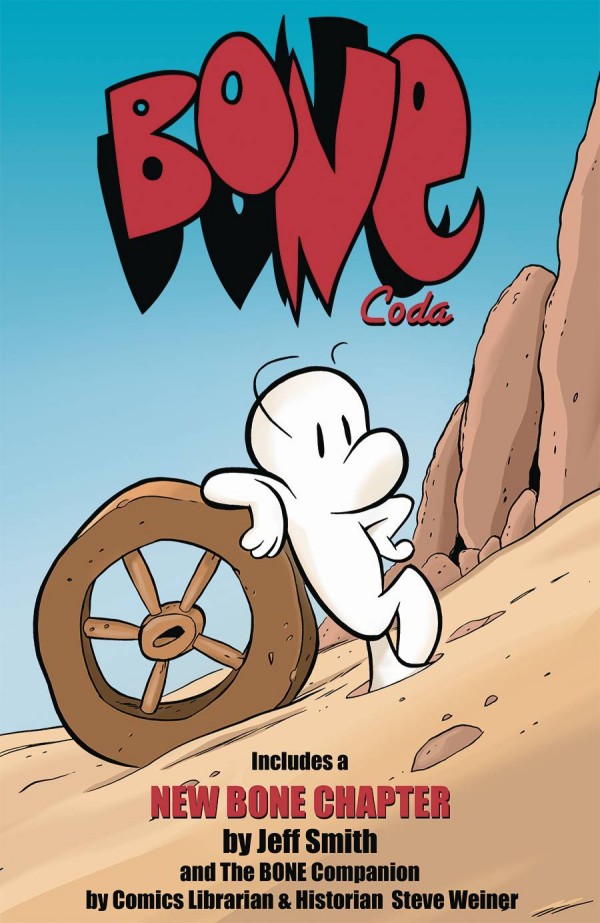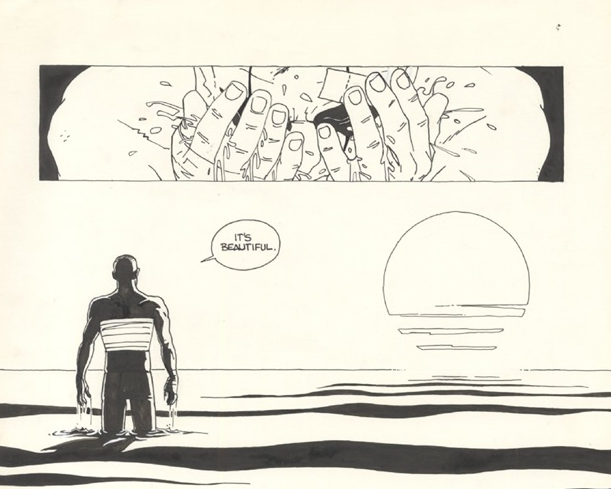 Written by Hiroki Endo
Written by Hiroki EndoIllustrated by Hiroki Endo
Dark Horse
Mr. Endo notes at the end of this book that short story collections do not sell well and therefore publishers are reluctant to release them. That's a shame, because I like them quite a bit. Kudos to Dark Horse for publishing this second set of Endo stories, giving us another glimpse into the smaller works of the man behind the Eden series.
There are five stories this time, two of which are linked together and the last is a short humor piece which at first seems out of place but in the end has the same dark view of humanity that the rest of Endo's stories contains.
Hang is up first, a dystopian future with two protagonists and the cyborg head of a third. They wander through a world that hangs on hooked cranes, just as their lives hang rather precariously. Even something as special as sex seems tainted, somehow.
There's a really dark and depressive air hanging over this story, and it's made all the worse by the cheapening of the sexual acts. By the end, it doesn't seem like this will ever change for the characters, which I think is Endo's point.
Of the stories in this volume, Hang by far has the best art. the depictions of the dystopian world are stunning, particularly the long shots of the cities. The details Endo puts into the buildings and their ultimate fate is really impressive. I also appreciate that the sexual situations are drawn to flow with the story. (This is also true in Platform, where sex is an integral part of the narrative.)
Endo himself shows up in High School Girl 2000, featuring himself as a 29 year old struggling artist who seems to resent those who are still in school. The story takes us back to his own high school years, where he wanted to be an artist in the big Tokyo schools but fails. Now he's trying to have all that he could not then, even maybe a high school girl as a lover.
I have to admit, this was a bit uncomfortable to read, but I think a lot of that has to do with the fact that it's very easy to feel like Endo does here. How many people want do redo some (or maybe all) of their lives, to take more risks or to experience more things? He's tapped into a very viable emotion here, and given voice to things I think a lot of readers would prefer to keep buried. The answer given to "What is the meaning of life?", "Doing the same things over and over again," is as haunting as the very real possibility that it's true.
The two part story, Platform, was a bit of letdown for me. A son estranged from his criminal father and older brother still hangs in their shadow, spending most of his time with a one-armed side man whose grown tired of the Yakuza life. His father is having sex with a girl whom the son has liked from a distance. The son tries to hurt both by watching them, but it fails miserably. Things start to fall apart and by the end, the son has no one--his friend is dead, his father is hurt but not killed, and the girl leaves, even after giving him what he thought he wanted.
There are some interesting moments, like when the girl talks about the power men wish for over women or even an object as benign as a canvas or that the one-armed man is playing a con game, but the whole story just feels too melodramatic for my taste and goes in all the predictable places. That's not like Endo as a writer, but he mentions he was younger when that one came out.
Last up is Boys Don't Cry, which has a comic premise--two kids arguing about sexual preferences in typical teen banter--but in just a few pages gives the undertone of questioning that pervades Endo's short works, even the weaker ones like Platform. The two kids may just be outwardly playing, but the boy isn't sure what he wants, and the girl knows what she wants but can't have it. That's a lot more interesting than sullen estranged sons, even if it's only six pages.
Overall, I don't think the stories in this second collection were quite as good as the first. However, they still have the themes of living the life that you're given which I enjoyed very much in the first volume. I referred to it then as short stories that make you think, and the concept still holds here, if a bit more diluted. The artwork also is a bit less focused, possibly because it's his older material.
Tanpenshu is a good fit for those who like post-modern fiction and would like to see it in graphic form. I'd easily recommend this to anyone who reads people like Eisenberg or latter-day Atwood, as the themes are similar, even if the ages of the characters are younger. While this may not have made Dark Horse a lot of money, I appreciate their willingness to bring a different sort of manga to English readers, and I would definitely welcome more of the same.







